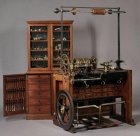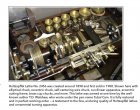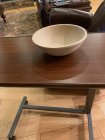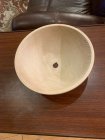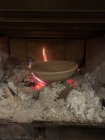In a thread not long ago, I spoke of "knowing what turners knew 100 years ago". In my opinion, the things our ancestors knew about turning, isn't something that can be written so that others can understand. You will not find the secrets of "spiritual turning" in any book. For the most part, these turners had a few turning tools, a lathe, and maybe a few words written in instruction. Very few of them had any formal training. Whatever they learned to produce, was basically by their own efforts.....and, those efforts were a culmination of years of experimentation, perseverance, and practical application.
Most of us are incapable of that kind of dedication, so most, or majority of the turnings, then and now, do not reflect that special spiritual connection. It's the same sort of thing that great artists display in their paintings, and even though some do have the dedication, only a few have that special something that makes their work stand out. We can see that, but it's hard to describe just what it is they have that others do not. Some call this "God given talent", but it's not something that is naturally occurring......it's something else, and it's very personal.
One of the disadvantages of living in these times, is the great plethora of tools, equipment, and advice available to those who want to learn. Some see the opposite, but IMHO, it all tends to confuse. The answer to the confusion isn't more and more new tools and advice, but to take what you have and apply some perseverance, mixed with a liberal dose of solitude, practice, and contemplation. Progress is slower this way, but the spiritual knowledge gained is compounded.
So.....what is this "spiritual turning"? As I said, it's something that is difficult, or maybe impossible to convey with words, so the method of communicating an understandable explanation is beyond worldly concepts. Your attuned senses are capable of comprehending what it is, but there are so many obstacles standing in the way of you ever getting there. You see, it only becomes clearer what it is.....when looking back at the paths you took to get there. The paths, themselves, are not "spiritual", but the effort to go down those paths....are!
-----odie-----
.
Most of us are incapable of that kind of dedication, so most, or majority of the turnings, then and now, do not reflect that special spiritual connection. It's the same sort of thing that great artists display in their paintings, and even though some do have the dedication, only a few have that special something that makes their work stand out. We can see that, but it's hard to describe just what it is they have that others do not. Some call this "God given talent", but it's not something that is naturally occurring......it's something else, and it's very personal.
One of the disadvantages of living in these times, is the great plethora of tools, equipment, and advice available to those who want to learn. Some see the opposite, but IMHO, it all tends to confuse. The answer to the confusion isn't more and more new tools and advice, but to take what you have and apply some perseverance, mixed with a liberal dose of solitude, practice, and contemplation. Progress is slower this way, but the spiritual knowledge gained is compounded.
So.....what is this "spiritual turning"? As I said, it's something that is difficult, or maybe impossible to convey with words, so the method of communicating an understandable explanation is beyond worldly concepts. Your attuned senses are capable of comprehending what it is, but there are so many obstacles standing in the way of you ever getting there. You see, it only becomes clearer what it is.....when looking back at the paths you took to get there. The paths, themselves, are not "spiritual", but the effort to go down those paths....are!
-----odie-----
.
Last edited:

